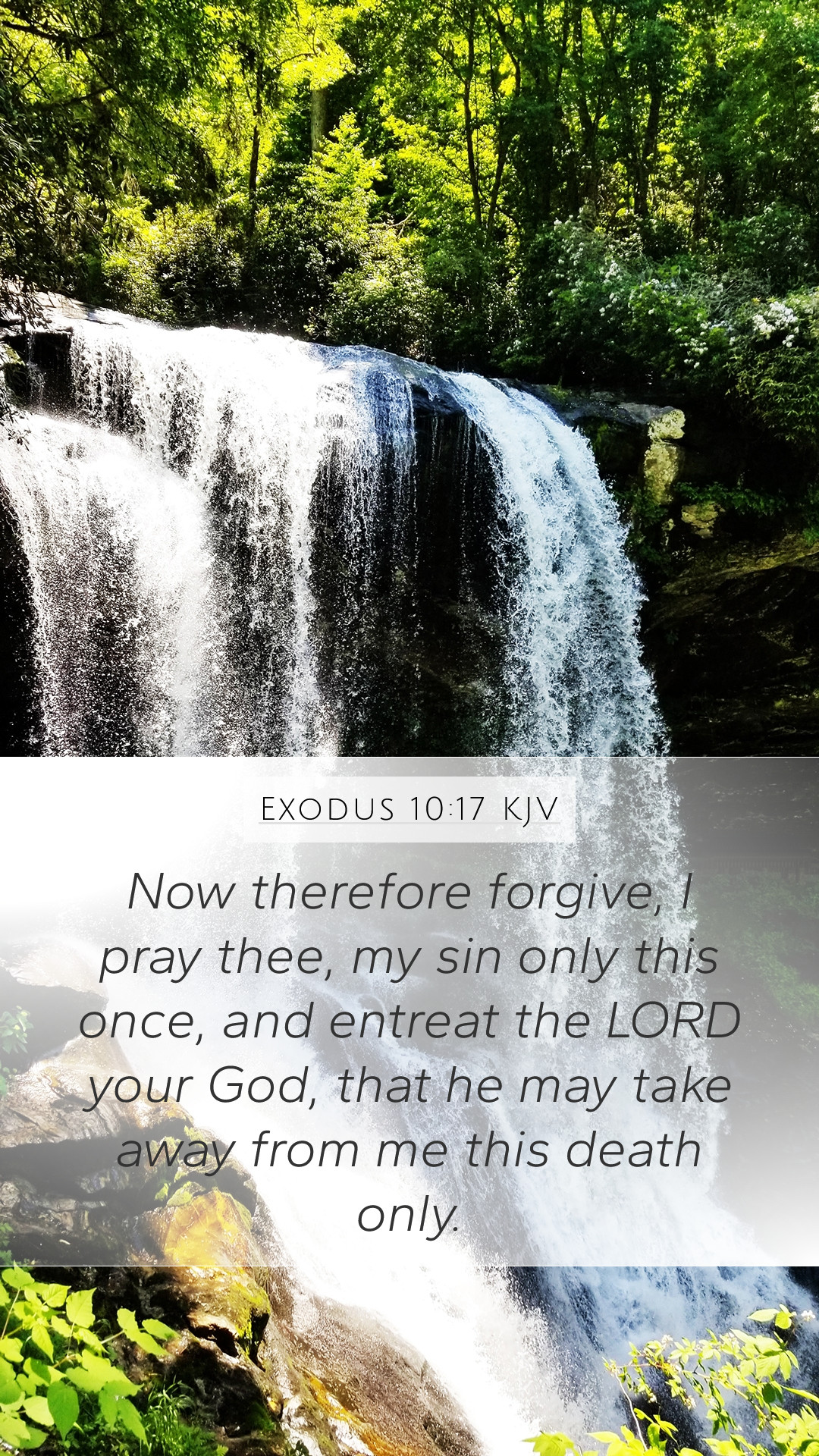Understanding Exodus 10:17
Bible Verse: Exodus 10:17 - "Now therefore forgive, I pray thee, my sin only this once, and entreat the Lord your God, that he may take away from me this death only."
Bible Verse Meanings
The meaning of Exodus 10:17 revolves around a plea for forgiveness and mercy. This verse captures Pharaoh's desperation as he confronts the severity of the plagues upon Egypt, particularly the impending death that follows the final plague.
Bible Verse Interpretations
Commentaries from renowned biblical scholars such as Matthew Henry, Albert Barnes, and Adam Clarke provide rich insights into this verse.
- Matthew Henry: He highlights Pharaoh's insincerity, noting how this plea reflects a moment of fear rather than genuine repentance. Henry emphasizes God's authority in the situation, and Pharaoh's acknowledgment that only the Lord has the power to relieve his suffering.
- Albert Barnes: Barnes points to the significance of Pharaoh’s acknowledgment of his sin, even if fleeting, and the futility of such a request when not accompanied by true accountability. He suggests that this moment illustrates the hardness of Pharaoh's heart, as he seeks relief while failing to commit to obedience to God.
- Adam Clarke: Clarke delves into the historical context, noting that Pharaoh’s repeated requests for mercy throughout the plagues reveal the struggle within him. He discusses the implications of Pharaoh’s plea on God’s judgment and mercy, reflecting on how divine justice operates even amid human stubbornness.
Bible Verse Understanding
Understanding Exodus 10:17 requires careful consideration of the broader narrative of the Exodus. Pharaoh’s repeated entreaties for forgiveness illustrate a cyclical pattern of sin, punishment, and temporary repentance. This underscores a larger biblical theme: the intersection of divine justice and human repentance.
Bible Verse Explanations
This plea for relief is significant not only for the text itself but for what it reveals about the nature of repentance and divine mercy. While Pharaoh calls for mercy, it serves as a reminder of how often humans may seek relief without true transformation of heart.
Insights from Commentaries
Pharaoh's Character
Both Henry and Clarke illustrate the complexity of Pharaoh’s character, portraying him as a figure of stubbornness and fear. His appeals come from a place of desperation rather than authentic faith.
God's Sovereignty
All scholars emphasize God's unwavering sovereignty throughout these events. This verse demonstrates that despite Pharaoh's attempts to negotiate with God, true authority lies solely with the Divine.
Bible Study Insights
When engaging in bible study groups or conducting online Bible study, this verse serves as a crucial reference point for discussions on repentance, forgiveness, and the nature of divine judgment.
Related Bible Cross References
- Exodus 9:27-28: Pharaoh acknowledges his sin yet continually hardens his heart.
- Exodus 10:3: The call for Pharaoh to submit to God’s authority precedes the final plagues.
- Psalm 51:1-2: A prayer for mercy and acknowledgment of sin, contrasting Pharaoh’s pleas.
Applying Bible Verses to Daily Life
Exodus 10:17 can prompt readers to reflect on their own lives: Are there instances where they seek help or forgiveness without a genuine change of heart? This verse calls believers to consider the sincerity of their repentance.
Conclusion
In summary, Exodus 10:17 bears rich meanings and interpretations that highlight the dynamics between fear, authority, and the urgent appeal for mercy. Commentaries provide valuable insights that enhance bible study insights and broaden our understanding of this scripture analysis.


